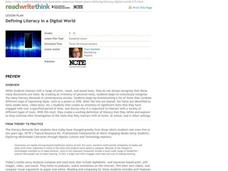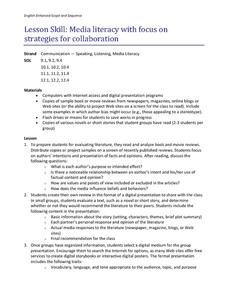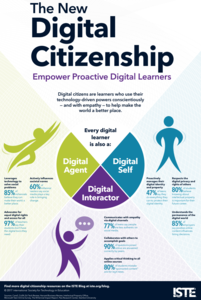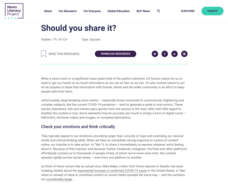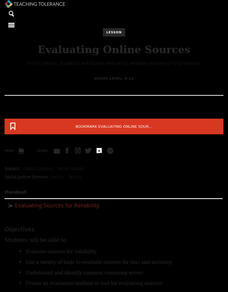Facing History and Ourselves
Citizen Watchdogs and the News
To conclude their case study of media coverage of the shooting of Michael Brown by a Ferguson, Missouri, police officer, class members consider the role of citizen watchdogs in a democratic society, develop strategies for combating...
The New York Times
Evaluating Sources in a ‘Post-Truth’ World: Ideas for Teaching and Learning about Fake News
The framers of the United States Constitution felt a free press was so essential to a democracy that they granted the press the protection it needed to hold the powerful to account in the First Amendment. Today, digital natives need to...
News Literacy Project
Fighting Falsehoods on Social Media
It's time to stop misinformation in its tracks. Scholars take an online quiz to see how well they understand social media platforms' policies on spreading false information. After taking the quiz, pupils receive a score with an...
Teaching Tolerance
Social Media for Social Action
Engage in activism, not slacktivism! Scholars discuss social media and the Internet as tools for social change. Next, they engage in a close reading strategy called Thinking Notes as they read an article about social media activism.
Open Oregon Educational Resources
Digital Foundations: Introduction to Media Design with the Adobe Creative Cloud, Revised Edition
How can Adobe Creative Cloud enhance digital art and media design? Readers explore just that with the Digital Foundations eBook. They learn how to source images and how to create symmetry and asymmetry in their digital designs. They also...
Teaching Tolerance
Media Consumers and Creators, What Are Your Rights and Responsibilities?
Teach the class to separate fact from fiction. Scholars explore the topic of fake news as they read PEN America's News Consumers' Bill of Rights and discuss the rights and responsibilities outlined in the bill. Next, they read an article...
ReadWriteThink
Defining Literacy in a Digital World
What skills are necessary to interact with different types of text? Twenty-first century learners live in a digital world and must develop a whole new set of skills to develop media literacy. Class members engage in a series of...
Common Sense Media
Digital Compass
Time to make some real world decisions in an interactive digital citizenship game. Choose a story and help the characters make the right decisions regarding Internet safety, cyberbullying, copyright, media literacy, appropriate online...
Curated OER
Media: Between the Lines
Learners in grades four through eight discuss, engage, and interact online to better grasp the concept of media. They will identify types of media, deconstruct media, understand how they personally use or interact with media, and work to...
Facebook
Online Presence
What happens when an online post gets the wrong kind of attention? Learners evaluate the good, the bad, and the occasionally ugly side of social media posting with a instructional activity from a vast digital citizenship series. After...
Overcoming Obstacles
Good Citizenship
An individual's background and experiences affect their worldview and interaction. In this lesson, scholars draw a pair of glasses with pictures of experiences they've been through, relate the responsibility to social media and the...
Teaching Tolerance
You Are the Product
What does it mean for a product or service to go viral? Scholars explore the topic by reading an article about the economics of social media. After reading, they complete a 3-2-1 data chart with information they learned from the text and...
Facebook
Metadata
In previous lessons, young journalists learned about how to trace the original source of scrapes and memes. This interactive lesson plan teaches them another important step in the verification process. Participants learn how to analyze...
Teaching Tolerance
News Consumers' Bill of Rights and Responsibilities
Believe it or not, people have rights as new consumers. Scholars read PEN America's News Consumers' Bill of Rights and Responsibilities and work in small groups to paraphrase chosen sections of the text. Next, they create and present...
Google
Online Safety Roadshow Activity
What does it mean to have digital citizenship? A set of lessons teach middle schoolers how to be safe and productive online. From sharing posts to creating secure passwords, learners discuss the importance of remaining diligent—and...
Southern Poverty Law Center
Evaluating Reliable Sources
A lesson plan instills the importance of locating reliable sources. Scholars are challenged to locate digital sources, analyze their reliability, search for any bias, and identify frequently found problems that make a source unusable.
Curated Video
Policy - The Community Guidelines
Following a site's community guidelines is just one step toward being an excellent digital citizen. After a brief introductory video, small groups come up with their own community guidelines and present their ideas to come up with a...
English Enhanced Scope and Sequence
Media Literacy with Focus of Strategies for Collaboration
Introduce your class to literary analysis with a series of activities that has them examine book and movie reviews. Groups then draft their own review of a text, select a digital medium, and craft a presentation.
ISTE
The New Digital Citizenship
Boost digital citizenship with an engaging infographic that promotes the importance of being a positive digital agent, self, and interactor.
News Literacy Project
Fact-Check It!
Here's a lesson designed to help learners develop their digital verification skills. First, expert groups study specific digital verification skills, and in a jigsaw activity, share what they have learned with classmates. The jigsaw...
Curated OER
Night and Day: A Digital Art Lesson based on Monet's Rouen Cathedral Series
Think about your favorite place ... now, think about what it looks like at different times during the day. How does the change in lighting affect the colors you see? Young artists explore the tools available in digital art software to...
News Literacy Project
Should You Share It?
Sharing isn't always caring. Scholars learn how to reduce the spread of misinformation on the Internet. They take an online quiz of example posts targeted to a specific audience. Using critical thinking skills, they see if they can tell...
Teaching Tolerance
Evaluating Online Sources
Newspapers, television, social media ... how do people get their news? Using the informative resource, scholars locate and verify credible sources of information. Working in small groups, they discuss strategies for evaluating the...
Curated OER
Your Digital Footprint: Leaving a Mark
A digital footprint is the trail of personal information that comes from purchasing online, tagging friends in photos, blogging, and using social media. Kids discuss what information can be tracked, privacy, and what your digital...
Other popular searches
- Digital Media Technology
- Digital Media Animation
- Digital Media English
- Debate Using Digital Media
- Digital Media Animation Math
- Introduce to Digital Media
- Digital Media Advertisement
- Analog Versus Digital Media








